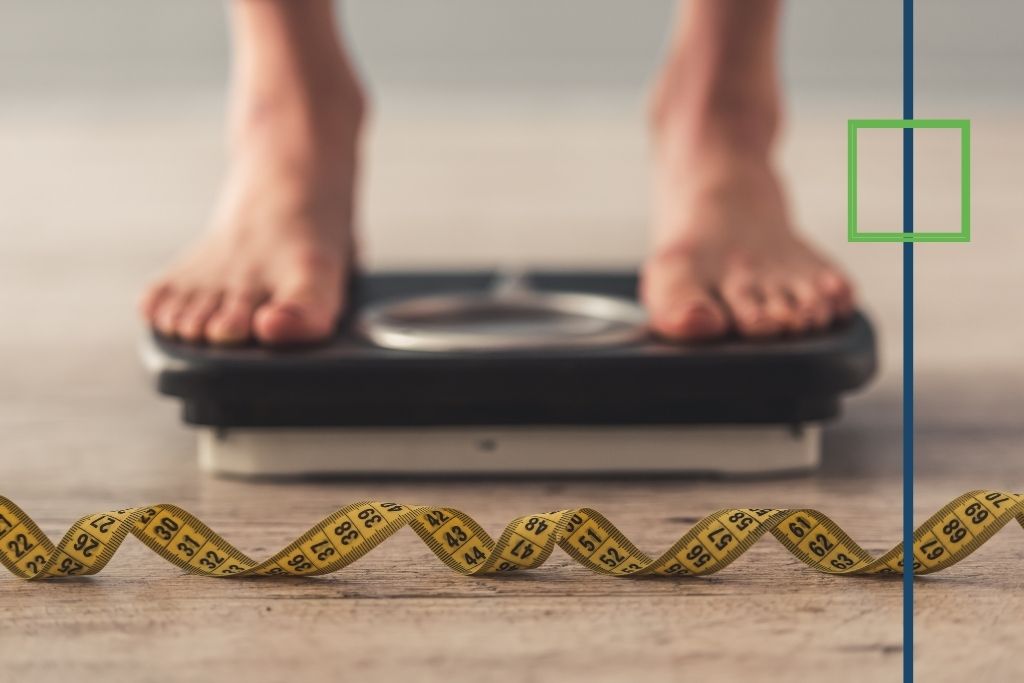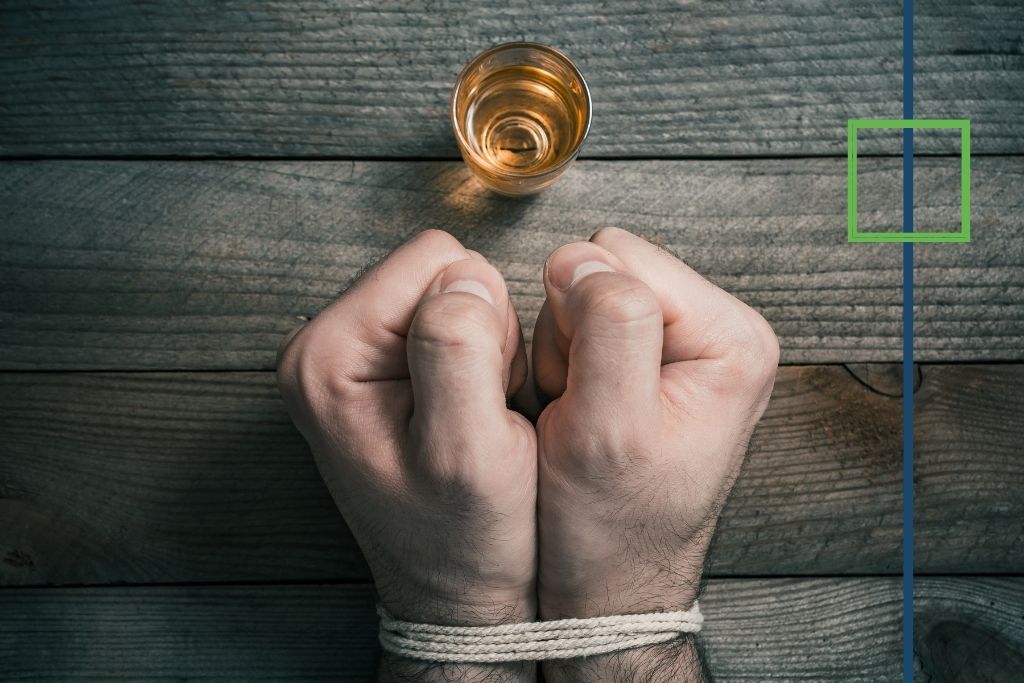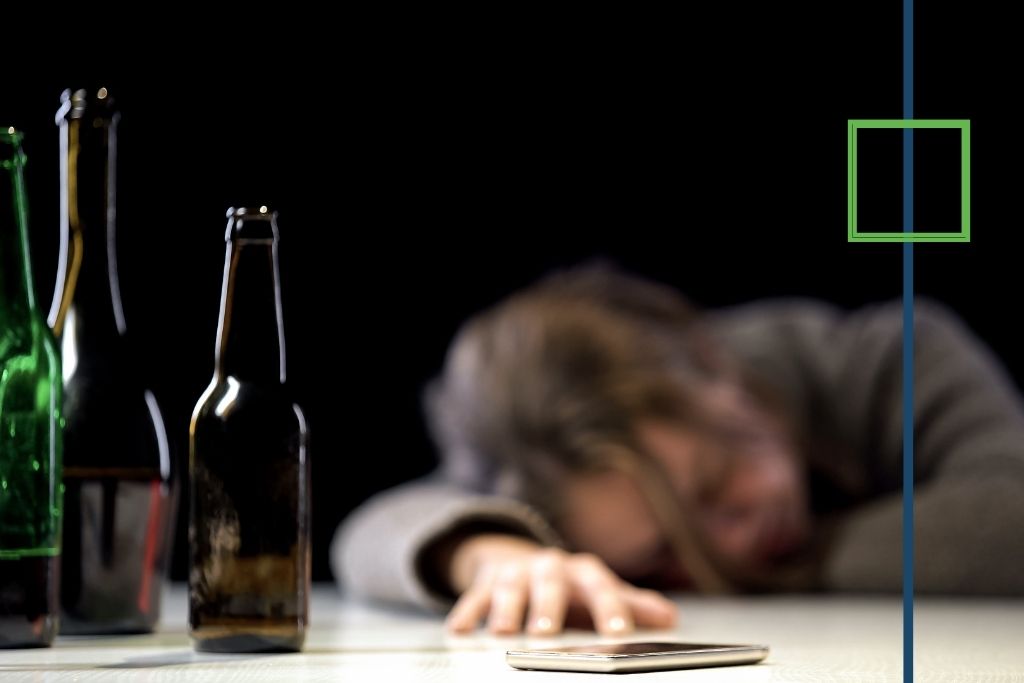When an individual drinks alcohol, it is processed by different organs and cells throughout the body. Signals are sent to and from the brain, and they might begin to feel or act differently. Depending on tolerance, effects might begin to be felt after a single drink or after several drinks. If more alcohol is consumed than what the body can process, a hangover could be experienced the next day. This begs the question, “How long does alcohol stay in your system?”
How the Body Processes Alcohol
Although alcohol goes through the digestive system it is not processed like food. The stomach and organ absorb the majority of alcohol before it is then passed onto the bloodstream which is why the effects of alcohol aren’t always felt immediately. Once the alcohol has passed through this organ tissue, it enters the bloodstream, circulating the body and resulting in the tell-tale signs of intoxication. It is not until alcohol has entered the bloodstream that metabolization can begin.
The bulk of alcohol processing is done in the liver which accounts for nearly 90% of alcohol elimination. It is able to do so with the aid of two enzymes: alcohol dehydrogenase (ADH) and aldehyde dehydrogenase (ALDH). The liver is only able to produce a certain amount of this enzyme, which limits the amount of alcohol that the liver can process at a given time. This rate is estimated to be about 0.015 BAC per hour. Excess alcohol beyond what the liver can process is pumped through your heart to your lungs.
Only a small amount of alcohol is excreted via urine, sweating, or breathing. Instead, the majority of alcohol is eventually broken down into carbon dioxide or water. Genetic factors can affect the body’s efficiency in this process which can instead result in a buildup of harmful alcohol byproduct acetaldehyde. This can cause drinkers to feel sick and experience flushing, headaches, nausea, and/or vomiting.
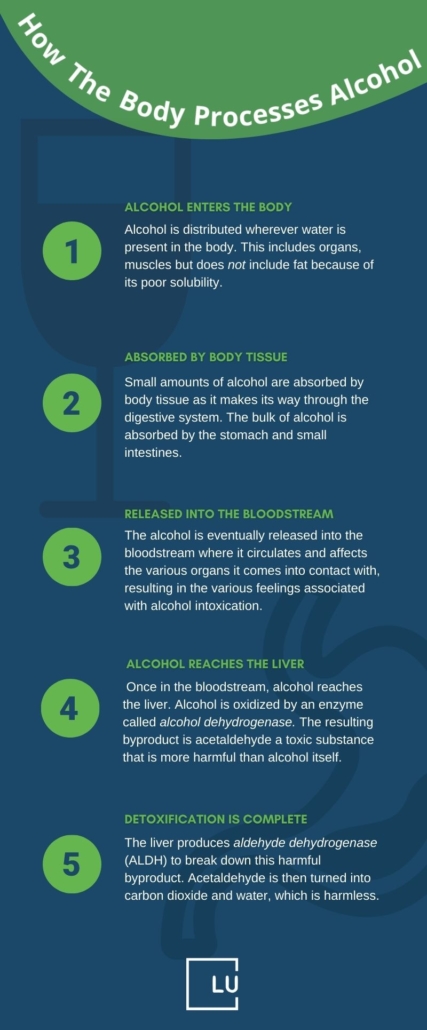
Factors that Influence Alcohol Processing
Each individual processes alcohol a little differently, meaning that they may be able to process alcohol faster or slower. Some factors are genetic, whereas others are not. Each affects how adept your body is at processing alcohol and ultimately, how long alcohol will stay in your system:
- Age
- Gender
- Ethnicity
- Weight
- Liver size
- Body fat percentage
- Recency of previous meal
- Hydration
- Quantity consumed
- Speed of consumption
- Tolerance
One of the most influential physiological factors falls along gender lines. In general, men tend to have a higher tolerance than women due to their larger size. Larger individuals (in this case, men) tend to have greater muscle mass which allows them to hold more water, which helps lessen alcohol concentration in the blood. For another instance, men typically have more ADH than women, which helps them process alcohol faster.
These are not hard and fast rules, however, as an individual’s tolerance can skew the factors that would normally influence alcohol procession. A woman who regularly drinks heavily and has a higher tolerance might process alcohol faster than a man who has never consumed an alcoholic beverage before.
Blood Alcohol Concentration (BAC)
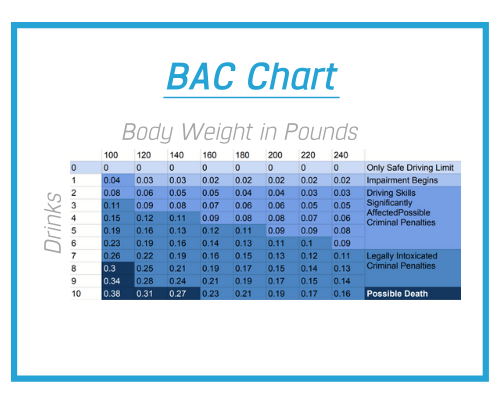
The acronym BAC stands for blood alcohol concentration, or how concentrated alcohol is within an individual’s bloodstream. All of the factors that influence alcohol processing in the body can also affect how quickly an individual’s BAC will rise and fall. BAC tables can be used to determine approximate blood alcohol concentration based on weight and number of drinks consumed, but breathalyzers and blood tests are much more accurate.
What’s Considered To Be A Standard Drink?
Did you know that 8 ounces of beer does not contain the same amount of alcohol as 8 ounces of wine? Differing alcohol volume (i.e. the strength of different types of alcoholic beverages) is among one of several reasons why a BAC chart alone is not a reliable means of calculating BAC levels. Although it may vary depending on the % alcohol, a standard drink is approximate:
- 12 ounces of regular beer (5% alcohol)
- 5 ounces of wine (12% alcohol)
- 1.5 ounces of liquor, (40% alcohol)
How Long Does It Take for Alcohol to Leave Your Body?
A typical, healthy liver can process about 1 standard drink per hour. This means it will typically take about 1 hour for alcohol to leave the body for each standard drink consumed. For instance, if 3 drinks are consumed around 8:00 PM, the alcohol will have left the body by about 11:00 PM. However, this time period becomes a lot less straightforward when additional drinks are consumed with the hour and gives the liver more to constantly process.
Even if you feel sober, it is important to give your body ample time to process the alcohol before attempting to drive or do anything that could be dangerous to yourself or others.
How Long Can Alcohol be Detected in Your Body?
Even if alcohol has been processed by the body, there are certain tests that can indicate that it was consumed following this time period. A urine test can detect alcohol for 12 to 48 hours after being consumed and breath tests can detect alcohol for up to 24 hours after consumption. Hair tests, however, can detect alcohol use for 90days beyond when alcohol was consumed.
Are You Concerned About a Drinking Problem?
When someone finds themselves asking “how long does alcohol stay in your system?” they may just be curious and wanting to be cautious. On the other hand, asking these types of questions often point to alcoholic tendencies.
If you are concerned that you or someone you love is drinking heavily and putting themselves or others at risk due to their behavior, they may be struggling with alcoholism. Alcohol addiction is common but is also a dangerous illness that requires the help of professional addiction treatment. Alcohol detox can cause severe withdrawal symptoms that need to be monitored and treated by medical professionals.
To get help with alcohol addiction recovery, contact Level Up Lake Worth today!

